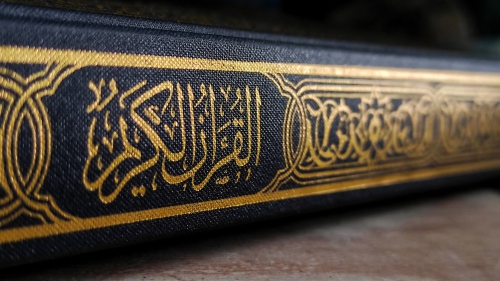Discontent and Anxiety Stimulates Scapegoating

Anne Applebaum, in an Atlantic article (May 6, 2024) states that:
"Be it the idea that the moon landings were faked or the attacks on the legitimacy of elections, wild theories have become surprisingly easy for (some) Americans to believe, a sign of a national gullibility that makes the United States an obvious target for outlandish propaganda.
Governments alone cannot solve this problem. Individual citizens have to take the initiative—as exhausting as it might be—to confront one another over bad information.
They need to ask questions: Where did you hear that? Why do you trust that source? Do you think that I, as a friend or a family member, am lying to you if I tell you it’s not true? People who have already been captured by propaganda will not believe official disclaimers from authoritative sources, and will see such disclaimers only as further proof of the conspiracy.
But when conspiracists and deeply misinformed people encounter people close to them, those whom they care about, who gently but firmly refuse to join them in the maze of misinformation, such discussions can sometimes have a positive effect, at least in the short term.”
Children caught with prohibited items in their hands often say x made me do it. In the same way most people in Middle East say the destruction of the world trade center buildings was done by the CIA to justify an attack on a Muslim country, or they argue that the Hamas invasion of Israel on October 7. 2013 did not happen.
The race to win the U.S. presidency has generated much more heat than light. The slow recovery from the Great Recession, Covid 19, the legalizing of gay marriage, artificial intelligence and ongoing terrorism in, and coming from the Middle East, make millions of Europeans and American’s fearful for their future.
An online poll taken by SurveyMonkey back in October 2016 found that 40% of U.S. voters said they had lost faith in American democracy. Widespread doubt about America’s future has split Americans in half (49 to 49) on whether “America’s best days are ahead of us or behind us.”
Terrorism makes people in many countries fearful. According to a poll in the Washington Post in Turkey, 7 out of 10 said terrorism was their No. 1 concern, as did 4 out of 10 in France. In the U.S. and India, it was the second-most important issue. In virtually every country, at least 3 in 4 said they expect a terrorist attack to occur within the next year. In France, Britain and the U.S., majorities blame "radical Islamic fundamentalists."
This anxiety had already produced a scapegoat long before the actual American election race; the religion of Islam. Scapegoating is the psychological term for people’s tendency to look for someone else to blame for their own personal, social or economic difficulties. It helps explain why people lash out at minorities rather than family members, colleagues, or bosses.
Scapegoating is as old as is Antisemitism but it has now been spread worldwide by the Internet. According to the Public Religion Research Institute’s annual American Values Survey (of 2,695 U.S. adults), released November 17, 2015, a majority of Americans (56 percent, including majorities in all the major Christian traditions) say the values of Islam are at odds with American values.
And according to FBI data released on March 13, 2023 hate-filled people in the U.S. hate all kinds of fellow Americans. Most of the victims, 64.5% were hated due to their race, ethnicity or ancestry. Another 16% were hated over their sexual orientation, and 14% of cases involved religious bias. Half of the religion hate cases targeted Jewish people.
That’s a significant rise of nine points from when Americans were evenly split, with 47 percent saying Islamic values were incompatible while 48 percent disagreed. Three large groups of Americans had a major increase in Islamophobia; and three smaller groups only had a small rise, or no increase at all.
The three groups of Americans having large numbers of people agreeing with the statement that the values of Islam are at odds with American values are: white evangelical Protestants (up 14 points to 73 percent from 59 percent in 2011); white mainline Protestants (up 16 points to 63 percent from 47 percent); and Catholics (up 20 points to 61 percent from 41 percent).
The three groups that did not show a significant rise in Islamophobia are all American minorities: only 55 percent of black Protestants said Islamic values were incompatible with American values (up only 4 points from 51 percent); and among Jews and “nones,” people who claim no religious label, there was no rise at all, because statistically speaking a one point difference (to 42 percent from 41 percent) is within the surveys margin of error.
Since Jews are non-Christians, and 95 percent of “nones” are ex-Christians; both groups are usually closer to each other in most surveys than either is to Christian public values.
Many people are very surprised to learn that Jews are much less Islamophobic than Christians even after eight decades of conflict between Palestinians and Israelis.
Most Rabbis would explain the low rate of Islamophobia among Jews by pointing out that Judaism is more compatible with Islam because both religions reject the concept of Jesus as the Son of God, and the doctrine of original sin.
Most Jews think of Jesus as a Rabbi; who was a mixture of a “believe in the power of prayer” Hassidic Rabbi, and a “don't make religion hard” Reform Rabbi. Other Jews also think of Jesus as a prophet, and some Jews even think of Jesus as a Messianic figure, who tried to liberate and redeem the Jewish People, but unfortunately was unsuccessful.
Judaism however, totally rejects the idea that Jesus was a Divine Messiah, the son of God, and a part of a Divine trinity. This is also the view of Islam.
Jesus refers to himself dozens of times as the “son of man” a messianic figure term. Paul, the creator of Christianity, who never met Jesus, never uses this term. Most of the non-Jews who convert to Judaism [about 3-5,000 a year] do so because, while they believe in God, they cannot believe that God has a son.
The similarities between Islam and Judaism are not confined to the unity of God, although that is of great importance. They extend to many general principles and even to details like the following: “A quick tempered man should not teach.” by Hillel, a first century Jewish sage, (Avot 2:6) and Ibn Abbas quotes Prophet Muhammad as saying: “Teach and make things easy, and if you are angry remain silent.” A Hadith related by Al-Bukhari in Al-Adab Al-Mufrad and by Ahmad.
“Who is a strong man? He who conquers his impulses; as scripture says, ‘One who is slow to anger is better than a strong man’.” by Ben Zoma, a second century sage (Avot 4:1) and “A strong man is not one who physically overpowers others. A strong man is one who controls himself when angry.” (Related by Al-Bukhari, Muslim, Abu Dawood and Ahmad).
Also all rabbis know that during the ten plus centuries of the Medieval Age, Jews were persecuted much less in Muslin countries than they were in Christian countries. Even today, Muslim extremist terrorists have slaughtered more Muslim victims, than the number of Christian and Jewish victims combined.
The time has come for all the best of religious conviction —especially from within the Muslim and Jewish minorities— to denounce and denigrate the activities and beliefs of those who are filled with the worst of religious convictions, before they desecrate and diminish all believers in the one God of Abraham.
Our religious and political leaders could help improve interfaith relations by constantly repeating the important lesson taught by the German Protestant Christian theologian Pastor Martin Niemöller (1892–1984) about the cowardice of German intellectuals following the Nazis' rise to power; and their subsequent purging of their chosen targets, one group after another: First they arrested Socialists, and I did not speak out— because I was not a Socialist. Then they arrested Trade Unionists, and I did not speak out—because I was not a Trade Unionist. Then they arrested Jews, and I did not speak out—because I was not a Jew.
Then they came for me—and there was no one left to speak out for me.
And our religious and political leaders could also help improve interfaith relations by constantly repeating the important lesson taught by an eleventh century Spanish Muslim theologian:
“Declare your jihad on thirteen enemies you cannot see - Egoism, Arrogance, Conceit, Selfishness, Greed, Lust, Intolerance, Anger, Lying, Cheating, Gossiping and Slandering [i.e., scapegoating]. If you can master and destroy them, then will you be ready to fight the enemy you can see.” — Imam Al-Ghazali

















